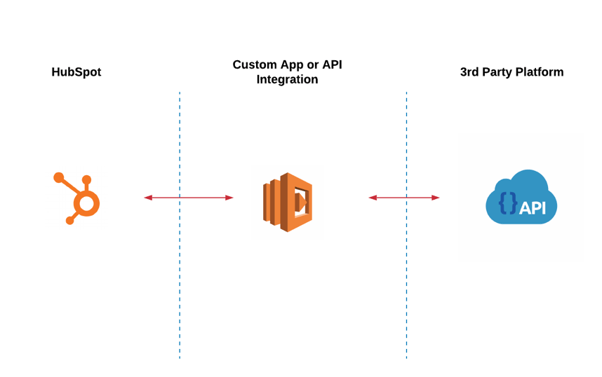When to use a native vs when a custom integration using the API
When should you use a marketplace integration (native integration) or a custom integration based on API? This is an important question to answer. The HubSpot marketplace provides you with many pre-built integrations but, sometimes the integration you need is not available. So when do you decide to go for a custom integration or for a pre-built integration?
What is an integration?
To start off with, what exactly is an integration? An integration is the process where your CRM - in this case, HubSpot - communicates with other platforms and services. It passes data from one system to another. The data is transferred over the internet via APIs (Application Programming Interfaces). These APIs are constantly sending and receiving data over the internet. Integrations are useful as they automatically transfer information between different systems so you can be better informed, make smart decisions and analyze data to improve your business.
There are two types of integrations: native and custom built integrations. Native integrations are the ones you can find in HubSpot's marketplace, whilst custom built integrations are specifically made for you. But what exactly is the difference between a default integration and one that is custom built?

Default Marketplace Integration
A default marketplace integration is located in the HubSpot app marketplace. They are plug-and-play solutions that do not require much development. Default integrations, for instance, use the fields from HubSpot and the other tool to communicate bi-directionally while it also immediately avoids duplicates and errors.
Benefits of a default marketplace integration:
- It is cheaper
A marketplace integration normally does not require large investments as they are often included in the services you already purchased, such as the HubSpot license or the license to the other tool you want to integrate with HubSpot. - It is already tested
Another pro is that default marketplace integrations are already tested. In the HubSpot marketplace you can see how many people downloaded the integration and if they are satisfied with the integration. Therefore you can check if the integration works as needed and what you can and cannot expect from the default integration. - Quick
The integrations in the HubSpot marketplace are built to be used immediately. Thus, if you download the integration you can, most of the times, start using it right away. This saves a lot of time as you do not need to wait for additional requirements, such as development and testing. - Limited development resources
Finally, default integrations are very useful if you have limited development resources or technical expertise. The marketplace's integration tools are typically designed to be user-friendly and require minimal coding or technical knowledge.
Custom integration using API
As the name suggests, custom integrations are integrations that go beyond the basic features offered by native integrations. Besides that, custom API integrations are portal-specific and specifically built for you. Some examples of custom integrations are:
- Pushing data into HubSpot after a transaction in an external system
-
Pulling data from an external system to display additional information in the HubSpot CRM.
Benefits/advantages of using custom integrations
- You control the process
With native integrations you are dependent on the rules established by the creators of the integration. With custom integrations, you design and determine what you would like to happen between the systems you integrate. This allows you to offer individualized and beneficial solutions for your specific company. - Personalization / advanced functionality
With custom integrations, the integration is specifically built for you, meaning you get what you want and you don't receive additional features that your business doesn't need. The custom integration adapts to the company, not the other way around, which smooths out your operation process and helps avoiding future conflicts. - It grows with you
While native integrations are limited in terms of their functions and scope, one of the advantages of creating your own integration is that it can adapt and grow with your company. What you need today from your HubSpot CRM will not necessarily be what you will need in a few months, so having this openness to continue modifying and perfecting it, is worth considering.
So, in the end, it is very important to take into account that the decision between a default marketplace integration and a custom integration using the API, is business specific. It depends on your specific business requirements, resources, and future goals. Therefore, it is important to evaluate the available options, consider the trade-offs, and choose the approach that best aligns with your needs!
You may also like

3 things to focus on when upgrading to HubSpot Enterprise Hub

Custom objects in HubSpot: What are they, and how can they help your business




